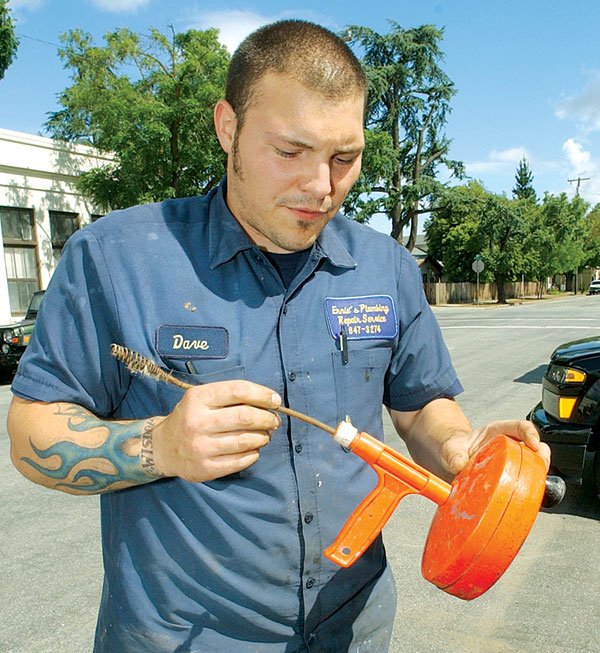Note to self: Don’t flush champagne glasses, aerosol cans,
bathing suits or dentures. This list may sound pretty strange, but
they’re all things that local plumbers have pulled out of stopped
up toilets.
Note to self: Don’t flush champagne glasses, aerosol cans, bathing suits or dentures. This list may sound pretty strange, but they’re all things that local plumbers have pulled out of stopped up toilets. The biggest key to avoiding plumbing problems, these experts say, is simply to use a little bit of common sense.
If, like most homeowners, you like your drains to remain working, avoid flushing bunches of paper towels down the toilet or putting whole pots of pasta in the garbage disposal, said Alfonso Bravo, owner of Economy Rooter in Gilroy.
Heavy items require more water to force down a drain, and when a clump of pasta lands in the garbage disposal it reduces the amount of water able to get through to the blades and wash away small pieces, said Bravo.
Other no-no’s for garbage disposals include artichoke leaves, celery stalks and potato or carrot peels, said Eunice Burgess, office manager for AAG plumbing in Morgan Hill.
“They’ll plug it up something fierce,” said Burgess, who’s learned some of these things the hard way as heavy or hard-to-chop items clogged her own drain.
A major problem that plumbers are called for is inappropriate disposal. While even macaroni could go down the drain if fed into the disposal slowly enough, some items were just not meant to be disposed of through pipe lines.
“People have this idea that you push that little handle, and it just goes down there forever,” said Carol Strohn, manager of J R Plumbing in Hollister. “For toilets there are all these different products out there they say they’re flushable, but they’re not. There’s just not enough water to move them down the line.”
Items like tampons, hemorrhoid pads and other personal hygiene products often become lodged in newer low-flow toilets, which use just 1.6 gallons of water per flush rather than older models that used more, such as 3.5 or 5 gallons.
Toilets sometimes have a hard time moving simple waste and toilet paper down their pipes in one flush, said Strohn, who noted the plumbers in her company affectionately refer to tampons as “white rats” in the line.
Other common blockages in toilets are caused by Q-tips, hair bunches and other small items that get caught in the commode’s trap and, as more and more of the same item is flushed down, accumulate until they clog and overflow the device, said Strohn.
Of course, sometimes the need for a plumber is unavoidable. Children often flush things they’re not supposed to. Faucets and toilets will break eventually.
It’s guaranteed someone in the household will forget to use their brain for a day, so be prepared.
“Maintenance is really important,” said Strohn. “People only think about their pipes and valves when something is wrong. Regular maintenance can prevent serious problems down the line. Under your sink you have shutoff valves. Periodically, just every couple of months, turn them off and on to make sure they still work.”
Most problems require minor fixes if tended to early, said Strohn, who compared a plumbing system to the human body. Preventative care, she said, is much cheaper and much safer than waiting until you have a plumbing crisis.
Another bit of advice from the experts: Look things over before you dial.
Not much is worse than having to pay a plumber to tell you that the toilet’s tank chain fell off.













